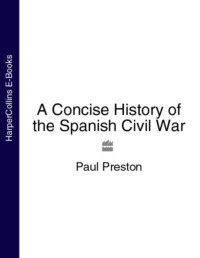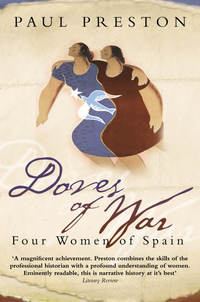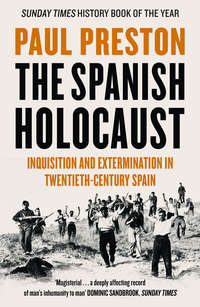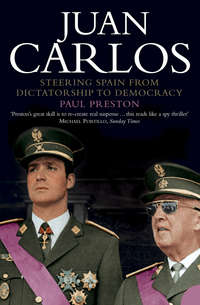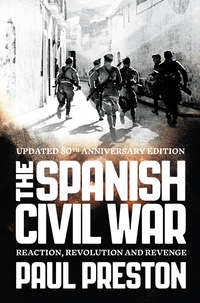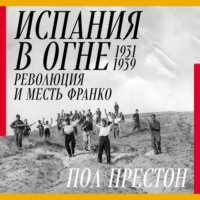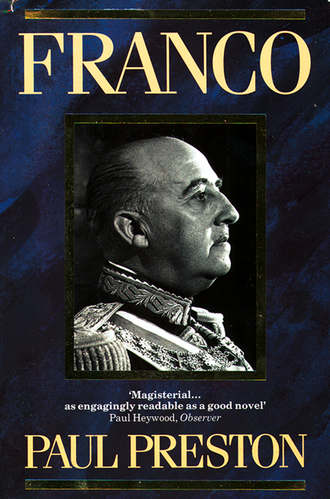
Полная версия
Franco
Doña Pilar’s unhappiness and stoical attempts to put a good face on her plight made it difficult for her to compensate her children for the behaviour of her husband. Each responded differently: Francisco identified with his mother, denying the need for his father’s approval which he longed for and never achieved. His hedonistic elder brother Nicolás grew up to be as pleasure-loving as his father, free with money and with women. His wild younger brother Ramón would be an irresponsible adventurer, famous for his exploits as an air-ace and notorious for his decadent private life in the 1920s and for a superficial involvement with both anarchism and freemasonry. Francisco was much more deeply attached to his mother than were either of his brothers. He regularly accompanied her to communion and was a pious child. He cried when he made his first communion. When on leave in El Ferrol, the adult Francisco would never fail to fulfil any religious duty for fear of upsetting his mother.*13
It is impossible to say with any precision what effect the separation of his parents and the departure of his father had on Francisco, although there is surely some significance in the fact that one of the few remarks that he ever made on the subject of children was: ‘small children should never be separated from their parents. It is not good to let that happen. The child needs to have the security provided by the support of his parents and they should not forget that their children are their personal responsibility.’14 As Caudillo, Franco denied vehemently that there was anything abnormal in Don Nicolás’s relationship with his wife or his children. On one occasion, however, when given irrefutable evidence of his father’s pecadillos, his reaction was revealing. He snapped ‘Alright but they never diminished his paternal authority’.15 The difficulties of Franco’s relationship with his father were later reflected in various efforts to reconstruct it in an idealised way. In his diary of his first year in the Spanish Foreign Legion, he told a clearly apocryphal story in which can be discerned his own longings. A young officer in Morocco is crossing the street when a grizzled veteran soldier salutes him. The officer goes to return the salute, their eyes meet, they look at each other and embrace in tears. It is the officer’s long-lost father.16 It was a trial run for his autobiographical novel, Raza, in which he created the father he would rather have had as a naval hero of total moral rectitude. When his father died, he had the body seized and implicitly reinvented the second part of his life by having him buried with a pomp which, while in accord with military regulations, was hardly appropriate to the bohemianism of Don Nicolás’s final years. Franco’s own lifelong avoidance of drink, gambling and women bore testimony to a determination to create an existence which was the antithesis of his father’s life.
Franco would implacably reject all the things he associated with his father, from the pleasures of the flesh to the ideas of the Left. Franco’s repudiation of his father was matched by a deep identification with his mother, something which might perhaps be seen in many aspects of his personal style, a gentle manner, a soft voice, a propensity to weep, an enduring sense of deprivation. A tone of self-pitying resentment runs through his speeches as Caudillo, a continual echo of the hard-done-by little boy that he must have been, and was one of the motivating forces of his drive to greatness.
Two great political events of Franco’s early youth were to dominate his later development – the loss of Cuba in 1898 and the involvement of Spain in a costly colonial war in Morocco. Imperial disaster provoked civilian distrust of an incompetent Army and intensified military resentment of the political establishment and of civilian hostility to conscription. Throughout his life, Franco would remark on the profound effect that the 1898 ‘disaster’ had on him. In 1941, when he was near to declaring war on the Axis side, he declared ‘when we began our life, … we saw our childhood dominated by the contemptible incompetence of those men who abandoned half of the fatherland’s territory to foreigners’. He would see his greatest achievement as wiping out the shame of 1898.17
Francisco was five and a half when the great naval defeat at the hands of the United States occurred in Santiago de Cuba on 3 July 1898. Spain lost the remnants of her empire – Cuba, Puerto Rico and the Philippines. Although it is highly unlikely that, at such an age, he was aware of what was happening, a disaster of that dimension could not but have a profound effect on a small naval garrison town like El Ferrol. Many of his school-friends lost relatives and wore mourning. Mutilated men were seen around the town for many years. More importantly, when he became a cadet in the Army, he went directly into an atmosphere which had festered since 1898. Defeat was attributed to the treachery of politicians who had sent naval and military forces into battle with inadequate resources. That it took the massively superior US forces three months to defeat the ramshackle Spanish fleet left Franco convinced that bravery was worth hundreds of tons of superior equipment.18
The defeat of 1898 had an immediate impact on Franco because of the consequent budget cuts. The Escuela de Administración Naval, the usual channel for boys of the Franco family into the Navy, was closed in 1901. It was decided that Nicolás and Francisco would prepare instead for the entrance examinations of the Cuerpo General de la Armada. They went to the local middle-class school, the Escuela del Sagrado Corazón. At this time, before his father abandoned the family home, Francisco was, according to contemporaries who saw him outside the family, a meticulous plodder, ‘good at drawing but otherwise quite average, quite ordinary. He was a nice lad, of a happy disposition, thoughtful; he took his time in answering questions but he was a playful lad.’19 He was of sickly appearance and so thin that his playmates nicknamed him cerillito (little match-stick). Within the family, his sister was struck by the extent to which Francisco emulated his mother’s quiet seriousness. He was an obedient, well-behaved and affectionate child, although timid, rather sad and uncommunicative. Then, as later, he had little spontaneity. He was very particular about his appearance, a trait that would follow him throughout his life. Even then he seemed older than his years and his obstinacy, astuteness and caution were evident. Among his closest childhood friends was his cousin Ricardo de la Puente Bahamonde, who would be executed in Morocco in 1936, with Franco’s acquiescence.20 As an adolescent, Francisco showed a normal interest in girls, favouring slim brunettes, mainly from among his sister’s schoolfriends. He wrote them poems and was mortified when they were shown to his sister.21
The loss of Cuba was to have serious domestic consequences. It hastened the rise of a regionalist movement in Catalonia and imbued Army officers with a determination to wipe away the ignominy of defeat through a colonial enterprise in Morocco. Catalan regionalism and the Moroccan adventure were to interract in an explosive manner. The demonstration in 1898 of Spain’s international impotence shook the faith of the Catalan élites in the central government. The Catalan economy had depended on the Cuban market and now the previously latent sense that Madrid was an incompetent and parasitical obstacle to Catalan dynamism found ever more vocal expression, above all in the appearance in early 1901 of the Catalanist party, the Lliga Regionalista.22 In the context of insecurity and humiliation provoked by the loss of Cuba, military anger at what was seen as as political betrayal during the war with the USA was compounded by the emergence of militant Catalanism, which soldiers perceived as an aggressive separatist threat to the unity of the Patria.23
In November 1905, the Barcelona offices of both the Catalan satirical magazine, Cu-Cut! and of the Lliga Regionalista’s newspaper, La Veu de Catalunya, were ransacked by three hundred fiercely centralist junior officers to the applause of the officer corps throughout Spain. Given widespread military approval of what was happening, the government was unable to impose discipline or to resist military demands for measures to punish offences against the honour of the Army. In 1906, politicians bowed to military readiness to interfere in politics by introducing the Ley de Jurisdicciones which gave the Army jurisdiction over perceived offences against the Patria, the King and the Army itself.24 It was a considerable boost to the Army’s sense of superiority over civilian society.
On reaching the age of twelve, first Nicolás and then Francisco, together with their fourteen year-old cousin, Francisco Franco Salgado Araujo, entered the Naval Preparatory School run by Lieutenant-Commander Saturnino Suanzes. There they became friendly with Camilo Alonso Vega, who was to remain a lifelong comrade. Nicolás, and a friend of the two brothers, Juan Antonio Suanzes, were successful in their efforts to join the Cuerpo General de la Armada. Nicolás chose to go to the Naval Engineering School. Franco and his lanky cousin Pacón* nurtured hopes of going to the Escuela Naval Flotante, the naval cadet ship. Then a decree was published restricting entry which closed the way to them. There was never any question of seeking a career other than a military one and so the now fourteen year-old Franco was sent to the Academia Militar de Infantería in Toledo. Pacón failed the entrance examination for 1907 but was successful the following year.25
When he accepted a post in Madrid in 1907, Nicolás Franco Salgado-Araujo went alone and gradually severed his links with his family. Members of his family have suggested that he was obliged to take the post, but having been able to spend nearly twenty years in El Ferrol without threat of being moved away, it seems more likely that he deliberately sought the posting to the capital in order to escape an unhappy marriage.26 Although there was no divorce from Pilar, he later ‘married’ his lover Agustina Aldana in an informal non-religious ceremony in Madrid and lived with her in the calle Fuencarral in Madrid until his death in 1942. A child who lived with them and to whom they were devoted has been variously described as their illegitimate daughter or Agustina’s niece whom they had informally adopted. The scandalized family referred to Agustina as his ‘housekeeper’ (ama de llaves).27
Accordingly, it was an embittered home in El Ferrol which the young Francisco left in July 1907 to take the entrance examinations for the military academy. He was accompanied on the long journey from La Coruña to Toledo by his father. Despite the fascination of the new landscapes through which he passed, the tension between him and his father made it a less than pleasant experience. Don Nicolás was unbending and rigid in the course of a journey during which his son needed encouragement and affection.28 Despite these inauspicious beginnings, Franco passed his examinations and entered the Academy on 29 August 1907 along with 381 other aspirants, including many future comrades-in-arms such as Juan Yagüe and Emilio Esteban Infantes. The Academy occupied the Alcázar built by Carlos V which dominated the hill around which the town was built. Far from the misty green valleys of Galicia and the placid ría in which he used to sail, dusty Toledo in the arid Castilian plain must have constituted a brutal shock. Although there is no evidence of his being sensitive to the wealth of religious art with which Toledo abounded, it appears that he responded to the sense of the past which pulsates in its streets. In his novel Raza, the character representing Franco (the cadet José Churruca) ‘got more from the stones [of Toledo] than from his books’.29 A growing obsession with the greatness of imperial Spain made him receptive to Toledo as a symbol of that greatness. His later identification with the figure of El Cid may also have had its origins in his adolescent ramblings around the historic streets of the town.
Life as an Army cadet would itself have strengthened his interest in Spanish history. Even by his own restrained account in later life, it is clear that he suffered some considerable agonies. Away from the loving care of his mother for the first time, young Franco had to grit his teeth and find inner reserves of determination to get on. In the austere conditions of the Alcázar, he would also have to deal with the problems arising from his anything but imposing physique (1.64 metres/5′4″ tall, and painfully thin). Already vulnerable because of the desertion of his father, the separation from his mother, his central refuge, must inevitably have forced him to cope with acute insecurity. He seems to have dealt with it in two related ways. First, he threw himself into Army life, fulfilling his tasks with the most thorough sense of duty and making a fetish of heroism, bravery and the military virtues. The rigid structures of military hierarchy and the certainties of orders gave him a framework to which he could relate. At the same time, he began to create another identity. The insecure teenager from Galicia would become the tough desert hero and eventually, as Caudillo, the El Cid-like ‘saviour of Spain’.30
On account of his size and high-pitched voice, he was soon called Franquito (little Franco) by his companions and, during his three years in the Academy subjected to various minor humiliations. He was forced to drill with a rifle which had had fifteen centimetres sawn off the barrel. He worked hard, with a particular interest in topography and the uncritical and idealized military history of Spain served up to the cadets. Having no interest in sexual or alcoholic safaris into the more disreputable parts of the town, he became a target for the cruel initiation ceremonies (novatadas) of his fellow students, against which he reacted with some violence. In his own muted version, recollected nearly seventy years later, he spoke of the ‘sad welcome offered to those of us who came full of illusions to join the great military family’ and described the novatadas as a ‘heavy cross to bear’ (un duro calvario).31 Other accounts, seeking traces of the later hero in the young cadet, recount his virile reactions. One oft-repeated story tells how his books were hidden and he was punished for not having them in the correct place. They were hidden again. The cadet officer was about to punish him again when Franco threw a candlestick at his head. When taken before the C.O., he refused to name those who had picked on him.32 Such behaviour helped him to make some friends, including Camilo Alonso Vega, Juan Yagüe and Emilio Esteban Infantes, although he was never to be close to any of them.
In Britain and America, the Army cadet at the turn of the century began his military studies only after completing his civilian education. In Toledo, young, relatively uneducated boys began to absorb Army discipline and the conventions of the military view of the world when they were that much more ignorant and impressionable.33 In professional terms, Franco can have learned little beyond the practical skills of horsemanship, shooting and fencing. The basic text-book was the Reglamento provisional para la instrucción teórica de las tropas de Infantería which was based on the lessons of the Franco-Prussian war and ignored the sweeping changes which had taken place in German military thinking since 1870. The increasing prominence given in both the German and British armies to the artillery and engineers was not replicated in Spain where the infantry remained dominant. The recent experience in Cuba was not used to draw any military conclusions, although they would have been immensely useful for the colonial adventures in North Africa. The stress was rather on discipline, military history and moral virtues – bravery in the face of the enemy, unquestioning faith in military regulations, absolute obedience and loyalty to superior officers.34 Cadets were also imbued with an acute sense of the Army’s moral responsibilities as guardian of the essence of the nation. No slight or insult to the Army, to the flag, to the monarch, to the nation could ever be tolerated. By extension, when a government brought the nation into disrepute by permitting disorder then it was the duty of the patriotic Army officer to rise up against the government in defence of the nation.
The method of training was usually the rote learning of masses of facts, in particular of the details of the great battles of the Spanish past. However, these battles were examined as exemplars of bravery and resistance to the last rather than analysed for their tactical or strategic lessons. Franco’s own central memory of his time at the Academy was of a major on the teaching staff who had been decorated for heroism with the Cruz Laureada de San Fernando (the Spanish equivalent of the Victoria Cross). He had been given the medal for a hand-to-hand knife fight in Morocco from which, Franco recalled with pleasure, ‘he still had the glorious scars on his head’. The impact on Franco’s way of thinking – and, indeed, on his own methods when Director of the Spanish General Military Academy at Zaragoza twenty years later – was revealed in his remark that ‘this alone taught us more than all the other disciplines’.35 When the cadets eventually went into the field, they had to improvise since they had been taught very little of practical application.
While Francisco was studying in Toledo, the events known as the semana trágica broke out in Barcelona in late July 1909. To military eyes, these disturbances were triply disturbing, with their connotations of anti-militarism, anti-clericalism and Catalan separatism. The government of Antonio Maura was under pressure from both Army officers close to Alfonso XIII and Spanish investors in Moroccan mines. Moreover, attacks by tribesmen on the railway leading to the port of Melilla had given rise to French threats to export their ore through Algeria. Maura also feared that France might use the apparent Spanish inability to keep order in her protectorate as an excuse to absorb it. Accordingly, he took advantage of an attack by tribesmen on the railway at Melilla on 9 July to send an expeditionary force to expand Spanish territory as far as the mineral deposits of the nearby mountains. The Minister of War decided to send a brigade of light infantry garrisoned in Barcelona. The brigade’s reservists, mainly married men with children, were called up and, without adequate preparations, embarked from the port of Barcelona over the next few days. Over the next week, there were anti-war protests in Aragón, Valencia and Catalonia in the home towns of the reservists. In Barcelona, on Sunday 18 July 1909, a spontaneous demonstration broke out against the war. On that same day, Rif tribesmen launched an attack on Spanish supply lines in Morocco. On the following day, news began to reach Spain of new military disasters in Melilla. Untrained, ill-equipped and devoid of basic maps, the appallingly ramshackle state of the Spanish Army was revealed again. Throughout the week, the scale of the defeat and of the casualties was inflamed by rumours. There were anti-war demonstrations in Madrid, Barcelona and cities with railway stations from which conscripts were departing for the war.
During the following weekend, anarchists and socialists in Barcelona agreed to call a general strike. On Monday 26 July, the strike spread quickly, although it was not directed against the employers, some of whom supported its anti-war purpose. The Captain-General of the region, Luis de Santiago, decided to treat it as an insurrection, overruling the civil governor, Angel Ossorio y Gallardo, and declared martial law. Barricades were set up in the streets of outlying working class districts and anti-conscription protests debouched into anti-clerical disturbances and church-burnings. General de Santiago could do no more than defend the principal points of the city because he feared that his conscripts would fraternize with the rioters. Reinforcements were delayed by the fact that the attention of the military high command and of the government was distracted by the battle of Barranco del Lobo in Morocco. By 29 July, however, units had arrived and the movement was put down over the next two days with the use of artillery. There were numerous prisoners taken and 1,725 people were subsequently tried, of whom five were sentenced to death. Among them was Francisco Ferrer Guardia, the free-thinking founder of the libertarian school, the Escuela Moderna.36
Particularly spine-chilling accounts of what was happening were given to the cadets in Toledo by their instructors. There was outrage that pacifists and revolutionaries should be on the loose while part of the Army was fighting for survival in Morocco. The many international demonstrations on behalf of Francisco Ferrer were seen by the young Franco as the work of international freemasonry. The circle of cadets in which Franco moved regarded the events in Barcelona, and the defeat at Barranco del Lobo, as evidence that the political establishment was weak and incompetent.37
The gulf between the military and civil society was widening dramatically at this time. It is impossible to comprehend Franco either personally or politically without understanding the extent to which he first assumed and then expressed the attitudes of the typical Army officer of his day. The milestones along the road to the civil-military divorce – the ‘disaster’ of 1898, the Cu-Cut! incident of 1905, the ‘tragic week’ of 1909 – were reached either shortly before Franco joined the Army or during his early, formative, years in the service. These events and their professional and political implications were inevitably the talk of military academies and officers’ messes. For someone as single-mindedly, not to say obsessively, committed to the military career as the young Franco, it was impossible for the resentments arising from these events not to be burnt deep into his consciousness.
Franco completed his studies at the Academy in June 1910. His ambition, like that of most of those who graduated at that time, was to go and fight in Morocco, where rapid promotion was possible and where he could help wipe out the shame of Cuba. On 13 July 1910, Franco was formally incorporated into the officer corps of the Army as a second lieutenant with the mediocre position of no. 251 of the 312 cadets of his year (of the original 381) who survived to graduate. Despite this mediocre start, Franco would be the first of his class to become a general.
It has been claimed that the young Franco applied immediately for a posting in Morocco, and was refused on the grounds of age, tough competition and his low place in the seniority list.38 In fact, there would have been no point making a formal application for a posting in Morocco since, at the time, only first lieutenants and above could be posted to Africa.39 He was posted to the Regimiento de Zamora no. 8, which was stationed in his home town of El Ferrol. There, from 22 August 1910 until February 1912, he was able to be near his mother and to show off his uniform to his contemporaries. He also had to face the crushing boredom of garrison duty in a small provincial town. Mornings were given over to parades and drills, afternoons to riding. Then there were guard duties. He was often able to eat at home. During this time, the continuing influence of his mother was reflected in the fact that he joined the religious confraternity Adoración Nocturna on 11 June 1911.40 He also consolidated his friendship with Camilo Alonso Vega and with his cousin Pacón. At the end of 1911, the order prohibiting second lieutenants from being posted to Morocco was lifted and all three began to make frequent transfer requests.
Perhaps suffocated by the gloomy domestic situation, probably driven by patriotism, certainly aware of a second lieutenant’s poor pay and that opportunities for promotion would come easier in Morocco than in a Peninsular garrison, Franco was anxious to be on his way and to overcome his 251st placing. While he was harkening to the siren calls of Africa, the Left was campaigning vigorously against the colonial war in general and against conscription in particular. Like many young soldiers, Franco developed what would be a lifelong contempt for left-wing pacifism. With the situation of the Spanish Army deteriorating in Morocco, the transfer requests of the three young officers were finally accepted on 6 February 1912. They were posted as reserves to Melilla. Franco and his two companions immediately set off on the long and difficult journey. With the road to the nearest railway station flooded by rain storms, and the port for the normal ferry service to La Coruña closed, they decided to go to the Naval Headquarters in El Ferrol in search of a ride. They were allowed to travel on board the merchant ship Paulina, which involved a hair-raising storm-tossed six hour journey standing in a gangway. From La Coruña, they carried on by rail to Málaga where they arrived after two days travel. They reached Morocco on 17 February 1912.41


